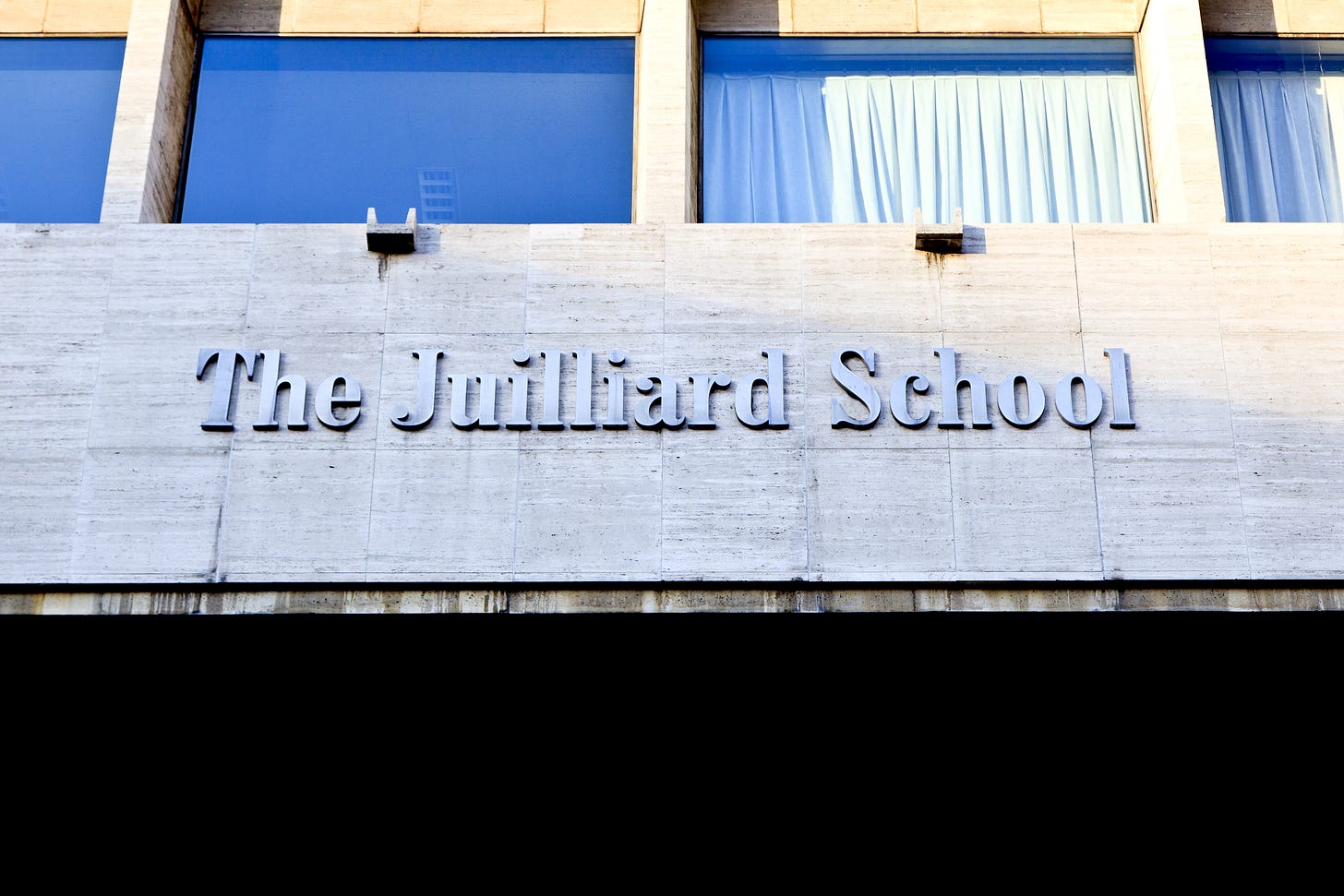E-Pluribus | May 24, 2021
Beliefs versus facts, the University of North Carolina and academic freedom, and what is going on at the Juilliard School.
A round up of the latest and best writing and musings on the rise of illiberalism in the public discourse:
Gary Saul Morson and Morton Schapiro: Beliefs Aren't Facts
While “fundamentalism” is usually discussed in the context of religion, whether it be a segment of evangelical Christianity or Islam, Gary Saul Morson and Morton Schapiro posit that the academic setting is similarly not free of those who find their own beliefs so unassailable that they refuse to engage with others who hold contrary views. But just as the beliefs of religious fundamentalists can take on a life of their own if not subjected to rigorous reexamination by succeeding generations of adherents, academic viewpoints and beliefs can become dogma to be handed down rather than rediscovered. Beliefs and viewpoints worth having are worth validating.
We have a theory that interconnected forces in several disciplines have led to a rise in styles of thought that, in our view, are fundamentalist. A fundamentalist, as we use the term, is absolutely certain that his system of thought gives him access to unvarnished truth, and therefore doesn’t waste time examining contrary evidence or engaging in dialogue with nonbelievers. The fundamentalist is unshakable in his belief that his viewpoint is perfectly clear and so cannot be misinterpreted. He reasons down from initial premises to what he takes to be unchallengeable conclusions. Such rigid ideological thinking has spread across economics and literary studies, as well as religion and politics. It occurs on both sides of the political spectrum—and at places in between. But it need not be that way.
We suggest that a good starting point involves reexamining our own assumptions, and recognizing our penchant for fundamentalist views. Everyone has some. It could be that markets allocate scarce resources better than any other conceivable system, or that great literature can be identified and appreciated regardless of the mores of the day. When we recognize beliefs of this sort, we should acknowledge that they are professions of faith rather than products of rational inquiry. For the most part, our thinking should remain open to persuasion. Living in echo chambers where our views are only ever reinforced by friends and the media does a disservice to us all. Ideological segregation, like any other kind, promotes the demonization of the excluded.
Read the whole thing.
Conor Friedersdorf: A Culture of Free Speech Protects Everyone
Last week, the University of North Carolina offered New York Times journalist Nikole Hannah-Jones a five-year contract for a special chair position but declined to include tenure at this point despite the faculty recommendation. While there is no consensus on the justification for the decision (see Around Twitter on last Thursday’s E Pluribus,) Conor Friedersdorf explores the available evidence. Despite Friedersdorf’s own misgivings about Hannah-Jones’s work, he argues that the apparent viewpoint discrimination that he believes motivated the decision is bad for everyone concerned about academic freedom.
Plenty of circumstantial evidence suggests that Hannah-Jones is a victim of impermissible viewpoint discrimination. An unnamed trustee at the university told NC Policy Watch that “the political environment made granting Hannah-Jones tenure difficult, if not impossible.” Critics of her hiring in North Carolina explicitly argued that “her 1619 Project’s tenets, of which a major part is the Critical Race Theory, will be driven into our state’s school curriculum where our children will be taught her beliefs every day,” and GOP political appointees in the state have shown little commitment to academic freedom.
All parties at UNC should be transparent about their actions. A denial of immediate tenure would not impermissibly discriminate on the basis of viewpoint if it were grounded, for example, in a new policy of subjecting all faculty hires to a trial period before granting tenure. The university might legitimately balk if faculty members urged that a candidate be granted tenure based on political rather than scholarly considerations, or if higher-ups had genuine misgivings about the rigor of a prospective hire’s work. The Raleigh News & Observerreported that “the journalism school’s dean, Susan King, said she was told that the UNC-CH Board of Trustees was hesitant to give tenure to someone outside of academia.” But prior Knight chairs had been given tenure based on professional experience rather than academic credentials. If the board of trustees acted because of some constitutionally permissible concern, they should show the proof now. Extended silence can reasonably be taken as an indication of suspect actions.
The committee that recommended tenure should also be transparent about its own process—including whether it considered the strongest criticism of Hannah-Jones’s work in reaching its conclusion.
Read it all here.
Heather Mac Donald: The Revolution Comes to Juilliard
Heather Mac Donald has written an extensive review of recent developments at the Juilliard School in New York City that threaten to subjugate the artistic pedagogy and mission of the institution to concerns over racial equity and inclusion. The lengths to which the administration of the school seems willing to go to placate the demands of a subset of the student population is shocking and should serve as a wake up call for other institutions similarly inclined towards greasing the squeakiest wheels.
It is taboo to question claims of racism-inflicted disability, since such a challenge denies someone his subjective “truth.” When it comes to race, subjective truth is now the only allowable truth. Nevertheless, the alleged psychic catastrophe occasioned by the audio recreation of the slave auction strains credulity. The experience of slavery is as remote from Juilliard’s black students as it is from Juilliard’s white students. Neither group has any realistic expectations of being subjected to such treatment. Imaginative empathy is a good trait for drama students, but so are emotional distance and objectivity. How broad must the protective cone be? Should museums shut down displays of slave shackles and whips? If the alleged emotional devastation here is taken at face value, it is time to retire the strained conceit of “white fragility” and replace it with “black fragility.”
The black drama students’ claim of being daily “broken” by the “harm and violence” they are forced to endure at Juilliard is equally unpersuasive. There are no racists at Juilliard, and the school’s leaders should say so. No one, it should not need stating, is engaged in violence against black students. To the contrary, Juilliard is filled with liberal, well-meaning adults who want all their pupils to succeed. Far from being oppressed, all of Juilliard’s drama students are fantastically privileged compared to actors in bygone centuries who picked up their thespian skills rattling around with a flea-bitten vaudeville or commedia dell’arte troupe.
The need to assert victimization at the hands of Western civilization is all consuming, however. It has led Juilliard’s drama students to opt for ignorance rather than knowledge, identity rather than imaginative freedom. Their August 2020 demands call for the elimination of all pedagogy that seeks to enhance an actor’s ability to transcend his particular identity. “‘Color-blind’ casting” (scare quotes in the original) must end, replaced by “color conscious casting practices.” No student of color should “be forced to leave behind their racial/ethnic identity when playing a role.” If a BIPOC student is cast in a non-BIPOC role, the director must justify that choice and reflect that justification throughout the production. The school should not “center” the General American Dialect in its speech and voice classes; doing so is “discriminatory.”
Read it all here.
Around Twitter
A long thread from Jeffrey Sachs on the University of North Carolina and Nikole Hannah-Jones:
A thread on how the CCP’s long arm of authoritarianism is trying to reach its way into the United States:
It took a couple of days, but the New York Times eventually reported on Chicago mayor Lori Lightfoot’s race-based interview policy, even calling it such:










